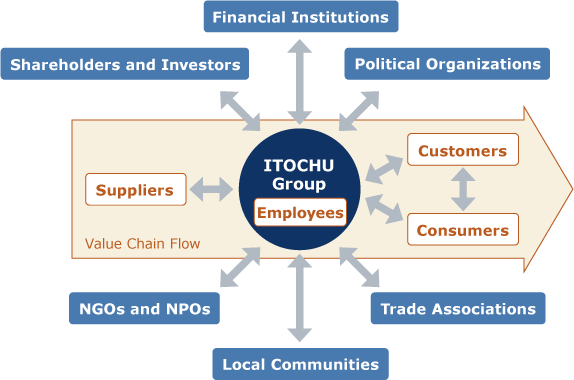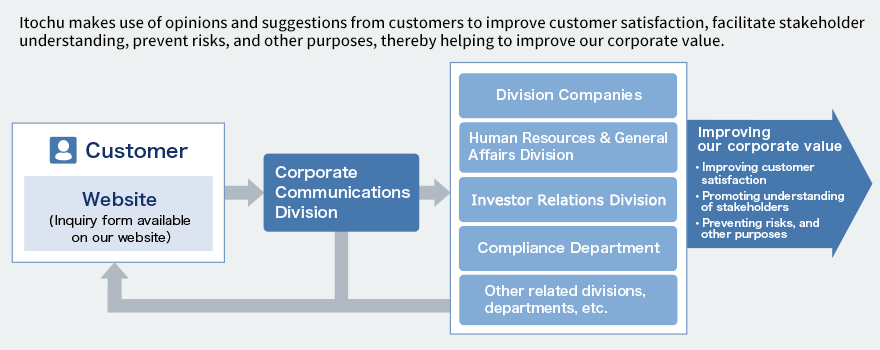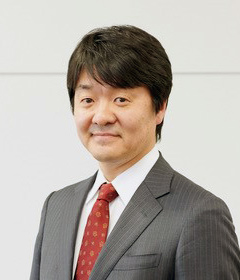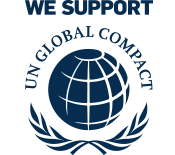Collaboration with Outside Initiatives
Participation in Initiatives
We participate in the following initiatives to promote sustainability.
Involvement in the United Nations Global Compact
In April 2009, ITOCHU Corporation joined the United Nations Global Compact, a global initiative to achieve sustainable growth for the international community. ITOCHU will fulfill our corporate mission of “Sampo-yoshi” in accordance with the United Nations Global Compact’s 10 principles covering human rights, labor, environment and anti-corruption.
The Ten Principles of the United Nations Global Compact
| Human Rights |
|
| Labour |
|
| Environment |
|
| Anti-Corruption |
|
Work with Global Compact Network Japan
ITOCHU is the corporate director of Global Compact Network Japan (GCNJ), the local network for the United Nations Global Compact in Japan. The GCNJ learns from other companies’ practices and academics, and also consists of subcommittees for deliberations and exchanging ideas on specific topics concerning approaches and initiatives for sustainability. In FYE 2024, ITOCHU proactively participated in the ESG subcommittee.
TCFD Consortium
ITOCHU announced its support for TCFD in May 2019, which encourages companies to disclose financial information related to climate change. By participating in the TCFD Consortium*, we will continuously engage in the appropriate disclosure of ITOCHU business risks and opportunities associated with climate change.
- The TCFD Consortium established on May 27, 2019 by Ministry of Economy, Trade and Industry (METI), Ministry of the Environment (MOE), and the Financial Services Agency (FSA) as a body for promoting discussion and deliberation among companies and financial institutions supporting the TCFD mission.
TNFD Forum
ITOCHU supports the principles and activities of the TNFD which promotes disclosure of the impact of nature-related risks and opportunities on corporate business and financial accounting. In June 2022, we joined the TNFD Forum to gain experience and knowledge and in October 2024, we also registered with TNFD Adopters. Through the forum, we have been gathering information on TNFD and is committed to appropriate disclosure in accordance with the TNFD Recommendations.
CDP (Climate Change, Water Security and Forests)
ITOCHU is actively providing information on ESG initiatives to various stakeholders around the world.
As part of these initiatives, we have been responding to climate change, water security and forests questionnaires of the CDP, which is recognized worldwide as a global standard for corporate environmental information disclosure.
- Please refer here
 for our company’s latest answers to CDP Questionnaire 2025 for climate change, water security, and forests
for our company’s latest answers to CDP Questionnaire 2025 for climate change, water security, and forests
GX League formulated by the Ministry of Economy, Trade and Industry
In 2022, ITOCHU expressed its support for the GX League Basic Concept established by the Ministry of Economy, Trade and Industry, and has been actively involving and making proposals at the public-private councils regarding the concept of emissions trading, the carbon credit market, and the ideal way to trade credits in the GX League. Taking into account our involvement of the various initiatives during the preparatory period for the establishment of the GX League, we participated in the GX League, which began in earnest in April 2023. The GX League will take on the challenge of GX (Green Transformation) with a view to achieving carbon neutrality and social change in 2050, and will serve as a forum for collaboration among industry, government and academia to achieve sustainable growth. As a participating company, our company will continue to be actively involved in the league’s initiatives, including emissions trading, which is a concrete policy tool for decarbonization, and contribute to the virtuous cycle of the environment, economy and society, including climate change.
Japan Climate Initiative (JCI)
ITOCHU participates in the Japan Climate Initiative (JCI), a network of Japanese non-governmental actors actively working to achieve the 1.5-degree target. This network gathers companies, local governments, organizations, and NGOs who support the idea of “participating from Japan on the front line of decarbonization.” With the active commitment of the Director in charge, the staff of the Sustainability Management Division participates in various seminars and other activities held by JCI to keep up with the latest trends of climate-related issues in Japan and overseas. In addition, we disclose information on our commitment and initiatives toward the decarbonized society on the JCI’s website. In 2025, we endorsed the “Japan Climate Action Summit 2025 Declaration” advocated by JCI. This declaration demonstrates our strong commitment, as a member of JCI, to realizing a decarbonized society. Please refer here![]() for more details.
for more details.
Japan Partnership for Circular Economy (J4CE)
ITOCHU is participating in the Japan Partnership for Circular Economy, a public-private collaboration established by the Ministry of the Environment, the Ministry of Economy, Trade and Industry, and the Japan Business Federation. This initiative aims to foster a deeper understanding and promote efforts towards a circular economy. Among more than 200 registered companies, the spotlight case collection released in 2025 features our textile company, which invests in and collaborates for the production of recycled polyester RENU. It highlights the resource circulation service PASSTO, which seamlessly conducts the collection, sorting, and redistribution of unused items.
RSPO (Roundtable on Sustainable Palm Oil)
Please refer here for details of our activities.
GPSNR (Global Platform for Sustainable Natural Rubber)
Please refer here for details of our activities.
KEIDANREN (Japan Business Federation)
- Committee on Environment
- 1% (One Percent) Club
- Council for Better Corporate Citizenship (CBCC)
- Committee on Responsible Business Conduct &
SDGs Promotion - Keidanren Nature Conservation Fund /
Keidanren Committee on Nature Conservation
Japan Foreign Trade Council (JFTC)
- Sustainability Promotion Committee
- Social Contribution & ABIC Committee
ESG Disclosure Study Group
Stakeholder Engagement
Policy & Basic Approach
In our diverse range of corporate activities conducted worldwide, ITOCHU Group place strong emphasis on dialogues with various stakeholders. We provide information about the ITOCHU Group activities, and we value the opinions of our stakeholders, both expectations and concerns. For our sustainable growth, we reflect measures in our business activities to further advance sustainability on a company-wide basis.

| Stakeholders | Frequency | Overview of Initiatives | Main Methods of Dialogue |
| Suppliers, Customers, and Consumers | Periodically As Needed |
We engage in fair and equitable transactions with business partners and comply with laws and ordinances. By building supply chain management that addresses social issues in human rights, labor and environment, we strive to provide safe and secure products and services to consumers. |
|
| Shareholders, Investors, and Financial Institutions | Periodically As Needed |
We emphasize dialogue with our shareholders, investors, and other stakeholders from the perspective of achieving sustainable growth and enhancing corporate value over the medium to long term. We strive to reflect obtained inputs into our management strategies and financial and capital policies. Through commitment-based management, we expand corporate value and sustain a positive cycle through effective engagement. |
|
| Political Organizations, and Associations | As Needed | We aim for the settlement of social issues and the sustainable development of the international community. We do this by complying with various relevant laws and ordinances formulated by government agencies and local governments in Japan and overseas. In addition, we promote business in cooperation with government agencies, local governments and industry groups. |
|
| Local Communities, NGOs, and NPOs | As Needed | We understand that our business activities affect local communities. Accordingly, we contribute to the sound and sustainable development of local communities. We do this by aiming to solve social issues in communities such as the creation of jobs, development of infrastructure, improvements in living standards and development of the educational environment. We strive to solve social issues through dialogue and collaboration with NPOs and NGOs. |
|
| Employees | As Needed | We endeavor to develop various measures and systems to realize decent work with aiming a challenging but rewardng company. We work to foster an organizational culture in which diverse human resources create opportunity of self-development and social contribution through their work. |
|
FYE 2025: The Expense of Associations and Social Contribution
(Unit: 1 million yen)
| Trade Association, Economic Association, Other Association | 70 | Social Contribution (Donation) | 604 (154) |
| Political Association | 28 | ||
| Total | 98 | ||
Major Donation Cases in FYE 2025
(Unit: 1 million yen)
| Subject of Donation | Amount | Summary | |
| General Incorporated Foundation National Political Association | 28 | Corporate donations to the National Political Association. | |
| Fukuyama City, Hiroshima Prefecture | 10 | Donation to support projects for Fukuyama city’s local development. | |
| EU-Japan Fest Japan Committee | 3 | Donation as part of a cultural exchange regarding a program to promote artistic and cultural exchange between Europe and Japan. | |
| Shiga Prefecture | 2 | Donation to support the environmental policies of Shiga Prefecture, the birthplace of our company. | |
Consultation Desk for the General Public (including Stakeholders)
ITOCHU Corporation has established a system to accept opinions, proposals, and grievances and to accept inquiries from the general public and all our stakeholders, as described below.

Third Party Opinion

CEO
Institute for Sustainability Management
It is difficult to say that international efforts to address issues such as climate change have yet achieved sufficient results. At the same time, due to the diversity and international reach of their businesses, general trading companies have a much broader scope of operations and a far more diverse range of stakeholders compared to typical companies, making it challenging to address sustainability issues that involve various risk dimensions. Additionally, with the increasing uncertainty in geopolitics and international politics, navigating these challenges has become even more difficult.
With this ESG Report, inclusion of LEAP analysis based on TNFD recommendations has commenced. ITOCHU Corporation, which has strengths in the non-resource field, can be especially commended for its proactive initiatives concerning business areas highly dependent on natural capital, such as forest resources, food, and textile materials.
In particular, initiatives related to natural rubber and similar areas serve as an advanced example in which business divisions are proactively taking steps in the realm of “nature.” It can be said that ITOCHU Corporation’s corporate mission, Sampo-yoshi (good for the seller, good for the buyer, good for society), is not just a slogan, but is steadily permeating its field operations.
Given that ITOCHU’s Corporation’s business spans a wide range of areas, it is necessary to prepare responses to diverse sustainability challenges as part of its “infinite missions.” Under its corporate philosophy, we anticipate the promotion of initiatives that meet and exceed the expectations of various stakeholders, especially in areas where the company’s strengths can be leveraged.

